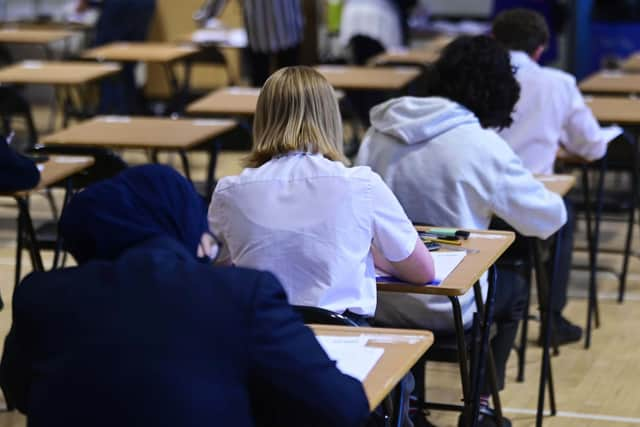SNP ministers warned they must not 'pass the buck' if Pisa rankings show further decline in Scottish education
SNP ministers have been warned they must not “pass the buck” if Scotland falls further behind in new Pisa world rankings today.
Opposition MSPs said the Government would need to finally make education its top priority if recent “extremely worrying” trends in maths, science and reading continue.
Advertisement
Hide AdAdvertisement
Hide AdPisa is the “programme for international student assessment”, which is held every three years by the Organisation for Economic Co-operation and Development (OECD).


At 10am today, the OECD will reveal the scores of 690,000 students, from 81 countries, who took part in the 2022 edition.
Between 2006 and 2018, the performance of the Scotland’s 15-year-olds had fallen from being the best in the UK to being behind England, particularly in maths and science.
Scottish Conservative education spokesman Liam Kerr said: "SNP ministers will not be relishing the publication of these statistics.
"Despite their insistence that education is their number one priority, that has simply not been the reality for Scotland’s schools.
"If these results show a further decline in Scotland’s Pisa scores, then the SNP cannot pass the buck.
"They must be upfront about the decline in Scotland’s once world-leading education system and finally make it their top priority, to ensure we rise up the rankings again.”
In yesterday’s Scotsman, experts predicted further falls in performance scores for a lot of countries as a result of the disruptions to education during the Covid-19 pandemic.
Advertisement
Hide AdAdvertisement
Hide AdMuch focus will be on Scotland’s results in comparison to the rest of the UK, which had similar lockdown rules.
Liberal Democrat education spokesperson Willie Rennie said: “This is a valuable insight into where Scottish education stands in the world, but the most recent reports have produced some extremely worrying findings.
“Year after year, the SNP continue to hold back and mismanage our education system.”
Andrea Bradley, general secretary of the Educational Institute of Scotland teaching union, urged caution, however.
“While Pisa is an extensive exercise and produces a vast amount of data, any survey of this type is limited in what it can say about any education system,” she said.
"The hard work and commitment of teachers to their students is impossible to measure or to reflect accurately in such a report.
"No matter what the findings of the Pisa study say, Scotland’s teachers will always give their best to support a quality learning experience for pupils of all backgrounds, irrespective of the many societal challenges that the country’s young people and their families continue to face and must be better supported with the requisite resources to do so.”
In 2010, the SNP Government withdrew from the Trends in International Mathematics and Science (Timss) and Progress in International Reading Literacy (Pirls) schemes, leaving Pisa as the only data study of its kind involving Scotland.
Advertisement
Hide AdAdvertisement
Hide AdIn March, the Government announced Scotland would re-join Timss and Pirls.
Labour education spokesperson Pam Duncan-Glancy said: “Scotland’s young people are in danger of being left behind, but the Scottish Government’s answer to this problem was to hide from comparison once we started performing poorly.”She added: “The Scottish Government should be leading the charge to regain Scotland’s status as world leaders in education but instead, they have delayed reforms, blamed teachers for the issues in Scotland’s schools and abandoned our schoolchildren.”
A spokesperson for the Education Secretary said: “Despite a cost-of-living crisis which is impacting on the poorest families in Scotland, and a Westminster Government that has failed to deliver the investment needed in public services, the Scottish Government is investing in our schools and taking action to support young people living in poverty.
“Our game-changing Scottish Child Payment and other anti-poverty measures mean an estimated 90,000 fewer children will live in poverty in Scotland this year. And our investment in schools means we have the lowest pupil per teacher ratio and the highest spending per pupil of any country in the UK. We have recently seen the biggest ever reduction in the attainment gap on literacy and numeracy in primary schools in a single year and we are seeing record numbers of young people entering work, training and further study less than a year after their final school year. The 2023 exam results also show that the gap between attainment levels in the least and most deprived areas is narrower than it was in 2019 across National 5s, Highers and Advanced Highers.”
Comments
Want to join the conversation? Please or to comment on this article.
